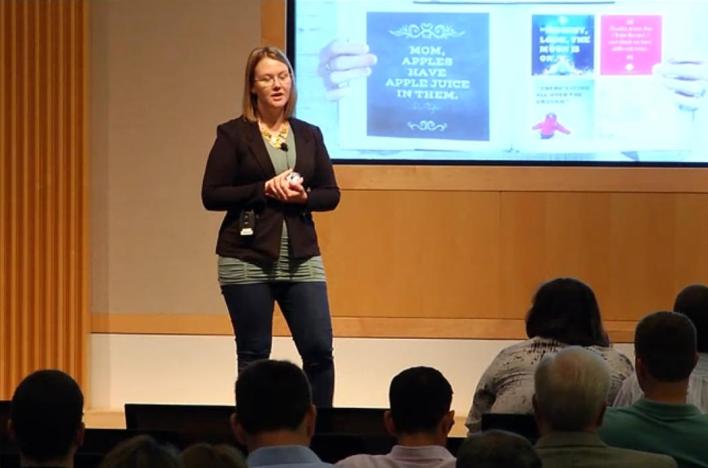This week’s 1 Million Cups at the Kauffman Foundation featured LittleHoots, an online platform to store and share children’s history, and a return visit from Knoda, which has redesigned its game-centric app for organizing the world’s predictions.
Lacey Ellis, founder and CEO of LittleHoots, began by explaining that her startup was a “memory-keeping platform” intended to replace traditional scrapbooks that parents have previously used to chronicle the precious and important moments of their offspring.
Ellis’ market is the 24 million mothers with children ages 2 to 8, and especially the 9 million millennial moms between 20 to 36 years old, who are highly connected to the web and social media. LittleHoots enables these young moms to capture audio, video, quotes, artwork, dialogue, photos and other content culled from their children’s experiences and store them in the Cloud.
LittleHoots currently has more than 900 users, Ellis said, and they have created more than 2,500 “memory tiles” about their kids, which can be shared on Facebook and Twitter and in the future on Instagram and Pinterest.
“Our biggest challenge is awareness,” Ellis said. “We’re just going to run Facebook campaigns and do whatever we can.”
Knoda at 1 Million Cups
Next up was Knoda founder Kyle Rogers, who first spoke about his online prediction app to the 1 Million Cups crowd in January. He was back to give an update on the company, which allows anyone to make a prediction about anything and turn it into a contest.
“Knoda is a lot easier to use now” and “more social,” Rogers said, thanks to a significant redesign. To encourage rivalries, the app now includes an enhanced scoreboard feature and leader board, he said, where users—or “Knodians”—can keep track of their and others predictive prowess in sports, entertainment, politics or what have you.
“You can predict on literally anything,” Rogers said. “We focus on what is relevant to a prediction, rather than a type of prediction.”
In the future, Knoda will also strive to give more credit to not just users who make correct predictions—like “the sun will come up tomorrow,” Rogers said—but to users making harder predictions that turn out to be right.
Knoda remains free to its users, with the company’s money-making plans tied to ads, sponsorships and the potential selling of accumulated data to market researchers.


